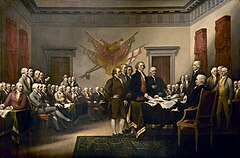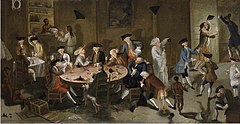Stephen Hopkins (politician)
This article needs additional citations for verification. (August 2009) |

Stephen Hopkins (March 7, 1707 – July 13, 1785) was an American political leader from Rhode Island who signed the Declaration of Independence. He served as the Chief Justice and Governor of the English Colony of Rhode Island and Providence Plantations and was a Delegate to the Colonial Congress in Albany in 1754 and to the Continental Congress from 1774 to 1776. Hopkins was also the first chancellor of the College in the English Colony of Rhode Island and Providence Plantations (predecessor to Brown University) in conjunction with the presidency of the Reverend James Manning.
Hopkins was born in Providence, Rhode Island, the son of William and Ruth (Wilkinson) Hopkins. Hopkins' younger brother, Esek Hopkins, became the first commander in chief of the Continental Navy. Hopkins grew up on a farm in Scituate, Rhode Island and was self educated. He moved back to Providence in 1742 and worked as a foundryman, merchant, ship owner, and surveyor.
At 19, he married Sarah Scott, with whom he had seven children, five of whom lived to maturity. Following Sarah's death, he married a widow named Anne Smith, but they did not have children together.
Early political career
When Scituate Township separated from Providence in 1731, Hopkins plunged into politics. During the next decade, he held the following elective or appointive offices: moderator of the first town meeting of Scituate, town clerk, president of the town council, town solicitor, justice of the peace, justice and clerk of the Providence County Court of Common Pleas (in 1733, he became Chief Justice of that court).
He served in Rhode Island's colonial assembly (1732–1752, 1770–1775) and was its Speaker from 1738 to 1744, and again in 1749. In 1754, he represented Rhode Island at the Albany Congress in New York, where he and others considered Benjamin Franklin's early plan for uniting the colonies and arranging an alliance with the Indians, in view of the impending war with France. He was elected Governor of Rhode Island nine times (1755–1756, 1758–1761, 1763–1764, and 1767).
Founding a new nation

Hopkins spoke out against British tyranny long before the revolutionary period. In 1764 he published a pamphlet "The Rights of the Colonies Examined" whose broad distribution and criticism of taxation and Parliament built his reputation as a revolutionary leader.
In 1773, he freed his slaves, and the following year, while serving in the Rhode Island Assembly in 1774, he introduced a bill that prohibited the importation of slaves into the colony. This became one of the first anti-slavery laws in the new United States.
He led the colony's delegation to the Continental Congress later in 1774, along with Samuel Ward, and was a proud signer of the Declaration of Independence. He recorded his name with a trembling right hand, which he had to guide with his left. Hopkins had cerebral palsy, and was noted to have said, as he signed the Declaration, "My hand trembles, my heart does not." Hopkins is easily distinguishable in John Trumbull's famous painting as the gentleman standing in the back wearing a hat.[1][2][3]
John Adams appreciated Hopkins's contributions, writing:
"...Governor Hopkins of Rhode Island, above seventy Years of Age kept us all alive. Upon Business his Experience and judgment were very Usefull. But when the Business of the Evening was over, he kept Us in Conversation till Eleven and sometimes twelve O Clock. His Custom was to drink nothing all day nor till Eight O Clock, in the Evening, and then his Beveredge was Jamaica Spirit and Water. It gave him Wit, Humour, Anecdotes, Science and Learning. He had read Greek, Roman and British History: and was familiar with English Poetry particularly Pope, Tompson [Thomson] and Milton. And the flow of his Soul made all his reading our own, and seemed to bring to recollection in all of Us all We had ever read. I could neither eat nor drink in those days. The other Gentlemen were very temperate. Hopkins never drank to excess, but all he drank was immediately not only converted into Wit, Sense, Knowledge and good humour, but inspired Us all with similar qualities."[4]

Hopkins' knowledge of the shipping business made him particularly useful as a member of the naval committee established by Congress to purchase, outfit, man and operate the first ships of the new Continental Navy. Through his participation on that committee, Hopkins was instrumental in framing naval legislation and drafting the rules and regulations necessary to govern the fledgling organization during the American War for Independence. The first American naval squadron was launched on February 18, 1776. Hopkins used his influence to secure the position of commander in chief of the new navy for his brother Esek Hopkins, an appointment that proved to be unfortunate.
In September 1776, Hopkins' poor health forced him to resign from the Continental Congress and return to his home in Rhode Island. From 1777 to 1779, Hopkins remained an active member of Rhode Island's general assembly.
Legacy

Hopkins helped to found a subscription library, the Providence Library Company, in 1753, and was a member of the Philosophical Society of Newport. Although largely self-educated, Hopkins was instrumental in the establishment of the College in the English Colony of Rhode Island and Providence Plantations as a founding trustee or fellow and served as its first chancellor from 1764 to 1785.[1] His home, the Gov. Stephen Hopkins House, is now a U.S. National Historic Landmark.
Stephen Hopkins died at his home in Providence on July 13, 1785, at the age of 78 and is interred in the North Burial Ground there. The town of Hopkinton, Rhode Island, was later named after him.
The SS Stephen Hopkins, a liberty ship named in his honor, was the first U.S. ship to sink a German surface warship in World War II.
Hopkins is renowned in historical calligraphy as author of "the worst signature on the Declaration of Independence."
In fiction
In the musical 1776, which tells the story of the drafting and signing of the Declaration of Independence, Stephen Hopkins is a main character, played by veteran character actor Roy Poole. He is depicted as a well-meaning, but cantankerous, maverick politician and drunkard, whose force of personality helps keep the Continental Congress together. When asked for his vote on opening debate on Virginia's resolution on independence, the representative from Rhode Island to the Continential Congress declares: "I’ve never seen, heard, nor smelled an issue that was so dangerous it couldn’t be talked about. Hell yes, I’m for debating anything!"
References
- ^ http://www.quiz-tree.com/Declaration-of-Independence-Trumbull.html
- ^ http://www.americanrevolution.org/deckey.html
- ^ http://upload.wikimedia.org/wikipedia/commons/0/0e/KeyTrumbullsDeclarationOfIndependence.gif
- ^ John Adams autobiography, part 1, "John Adams," through 1776 sheet 28 of 53, Tuesday November 28. 1775.electronic diary copy (accessed November 11, 2008)
External links
- Stephen Hopkins House, Providence, Rhode Island
- Stephen Hopkins' Biography by Rev. Charles A. Goodrich (1856) at ColonialHall.com
- United States Congress. "Stephen Hopkins (id: H000781)". Biographical Directory of the United States Congress.
- Encyclopedia Brunoniana
- Stephen Hopkins at Find a Grave
- Biography VI - Stephen Hopkins
- Brown University Charter
- 1707 births
- 1785 deaths
- Continental Congressmen from Rhode Island
- Chancellors of Brown University
- University or college founders
- Foundrymen
- American abolitionists
- Political leaders of the American Revolution
- Patriots in the American Revolution
- Signers of the United States Declaration of Independence
- People of Rhode Island in the American Revolution
- People from Providence, Rhode Island
- Governors of Rhode Island
- American people of English descent
- People with cerebral palsy
- Members of the Rhode Island General Assembly
- Rhode Island in the American Revolution
- Politicians with physical disabilities
- People from Scituate, Rhode Island

